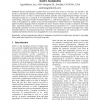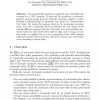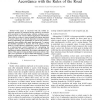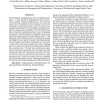725 search results - page 109 / 145 » Learning Behaviors Models for Robot Execution Control |
INTERACT
2003
13 years 10 months ago
2003
: Whereas sophisticated computer users can exercise more control in what they are exposed to and produce computational artifacts, technologically challenged end-users assume a more...
TAP
2008
Springer
13 years 8 months ago
2008
Springer
Pex automatically produces a small test suite with high code coverage for a .NET program. To this end, Pex performs a systematic program analysis (using dynamic symbolic execution,...
ICRA
2006
IEEE
14 years 2 months ago
2006
IEEE
Abstract— This paper is concerned with the in-field autonomous operation of unmanned marine vehicles in accordance with convention for safe and proper collision avoidance as pre...
SASO
2008
IEEE
14 years 3 months ago
2008
IEEE
Truly ubiquitous computing poses new and significant challenges. A huge number of heterogeneous devices will interact to perform complex distributed tasks. One of the key aspects...
ICAC
2007
IEEE
14 years 3 months ago
2007
IEEE
— Reactive systems are those that maintain an ongoing interaction with their environment at a speed dictated by the latter. Examples of such systems include web servers, network ...




